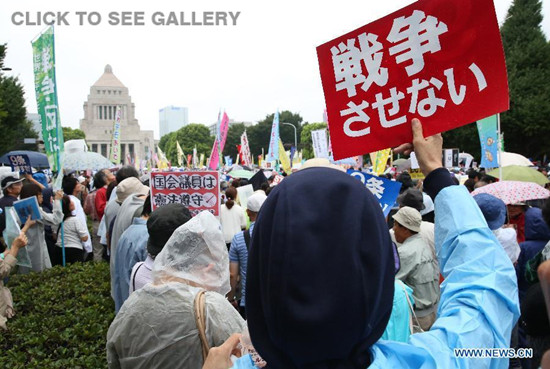Protesters hold placards during a rally against the controversial security bills in Tokyo, Japan, Aug. 30, 2015. (Photo: Xinhua/Liu Tian)
Some 120,000 people rallied and surrounded Japan's parliament building in Tokyo on Sunday, demanding Prime Minister Shinzo Abe rescind the controversial security bills.[Special coverage]
Political heavyweight Ichiro Ozawa, who also serves as a co- head of the People's Life Party, and other opposition leaders also participated in the largest rally recently seen in Tokyo. According to organizers, similar demonstrations against the bills were also held across the country at the weekend.
Katsuya Okada, leader of the largest opposition Democratic Party, said the security-related bills violated Japan's pacifist Constitution, adding that the Japanese people were angered by the bills with a sense of crisis.
The Communist Party chief Kazuo Shii said the Abe administration avoided directly answering questions over the bills during parliament deliberations, vowing to stop the bills' endorsement in the upper house.
For his part, Ozawa, in a rare public appearance, said the awkward bills should be thwarted and called for united efforts to retract the bills and force the Abe administration to step down. The new legislation was rammed through the Diet's lower house last month and now is under debate in the upper house.
However, the ruling camp enjoys two-thirds majority in the lower house, meaning that if the upper house vetoes the bills, they could also be enacted in a new poll in the lower house by securing over two-thirds of support.
The bills, which are considered in contravention of the country 's war-renouncing Constitution by about 90 percent of constitutional experts, will enable Japan's Self-Defense Forces ( SDF) to engage in armed conflicts overseas and help defend others even if Japan is not attacked, or exercise the right to collective defense.
The pacifist Constitution bans the SDF from combating abroad and using the right to collective defense, but the war-renouncing Article 9 of the Constitution will no longer serve as a stricture on Japan's use of force.
Opponents said the bills will increase the risk of the SDF being dragged into armed conflicts and thus endanger Japanese people's right to live in peace.
Meanwhile, Teiichi Tanigaki, secretary general of Abe's ruling Liberal Democratic Party, said the security legislation issue should be resolved during the current Diet session, hinting that the ruling party will steamroller the controversial bills through the Diet that has been extended to late September, broadcaster NHK said Sunday.



















































